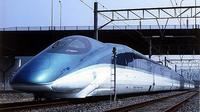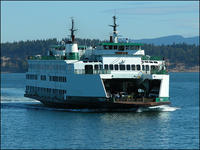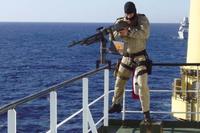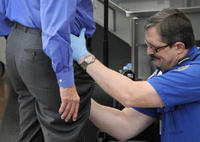-
CBP Announces New Small Vessel Reporting System

U.S. Customs and Border Protection the other day announced the availability of the Small Vessel Reporting System along the northern border and in Florida, Puerto Rico, and the U.S. Virgin Islands; the system is voluntary, and — as is the case with the air travel’s Trusted Traveler program — it aims to provides expedited entry procedures to trusted boaters; the system is open to all U.S. citizens and permanent residents, as well as Canadian citizens
-
-
Making high-speed rail tracks safer

High-speed rail requires prestressed concrete railroad ties, as wooden cross ties are too flexible; for these ties to be effective, prestressing forces must be applied at a considerable distance before the rail load is applied; this is called the transfer length; to resist the heavy impacts the concrete ties utilize about twenty steel wires, each stressed to around 7,000 pounds; if the prestressed force is not properly transferred, failures can occur in the track
-
-
Sector Report for Thursday, 26 May 2011: Transportation Security
This report contains the following stories.
-
-
"See Something, Say Something" campaign hits Seattle ferry system

Last week, a senior DHS official examined security measures at the nation’s largest ferry system; Betsy Markey, DHS’s assistant secretary of intergovernmental affairs, rode aboard a ferry last Thursday in Seattle as it sailed from Colman Dock to Bainbridge Island; Markey’s visit comes as a part of a broader DHS push to promote its “If You See Something, Say Something” public awareness campaign; the campaign will be implemented in conjunction with the Washington State Ferries (WSF) system; WSF is the largest and most complex ferry system in the United States with its twenty terminals and nine routes
-
-
Justice Department threatens to cancel flights to Texas
Last week, Texas lawmakers were forced to back away from a bill that would have outlawed airport pat-downs after the U.S. attorney general’s office threatened to cancel flights to Texas; the Texas House passed a bill that would have made it illegal for Transportation Security Administration (TSA) agents from conducting thorough pat downs at airport security checkpoints unless they had probable cause; the U.S. attorney general said that the law would be unconstitutional, and if passed, TSA would be forced to cancel flights to Texas
-
-
47,000 pedestrians killed in last decade
A recent study shows that walking in the United States has become increasingly dangerous; in the last ten years, nearly 50,000 pedestrians were killed and 688,000 injured in accidents; the study, conducted by Transportation For America (TFA), a coalition of transportation, environmental, and business groups, found that four of the top five most dangerous areas for pedestrians were located in Florida; 67 percent of pedestrian fatalities occurred on federal-aid roads, which are eligible for federal funding and have federal guidelines and oversight for their design
-
-
Senators outline long-term transportation spending plan
On Wednesday, a bipartisan group of senators announced that they had come to an agreement on a long-term transportation spending bill; since 2008, highway and transit construction programs have had an uncertain fate, but the proposed bill would allocate roughly $56 billion a year to highway and transit construction; it is unclear what the final bill will look like as the Senate, House, and executive branch each have diverging views on highway funding; funding the transportation bill will be no small feat; a two year Senate bill would require $12 billion in additional fuel tax revenues and a six year bill would require an addition $70 billion
-
-
Boston tries to bar hazmat trucks from downtown -- again
On average, 317 big trucks and tankers carrying hazardous materials travel through downtown Boston every day; in 2006 Boston had barred hazmat trucks from entering downtown, but federal officials voided the restrictions last year, saying Boston did not show sufficient cause to justify the restrictions; the city commissioned a study on the issue, which recommended diverting hazmat traffic from downtown to a route which will see the truck take the already-congested Route 128, which cuts through Boston’s western suburbs; businesses and cities along the proposed rout object
-
-
Ships increasingly turning to armed guards to combat piracy

To stem the rapidly growing number of pirate attacks in the Indian Ocean, more shipping companies are turning to armed guards; last year attacks off the Somali coast hit an all-time high with forty-nine ships hijacked along with 1,016 crew members; to combat the growing threat of piracy an estimated 20 percent of ships operating in the Indian Ocean and the Gulf of Aden will hire armed guards within the next eighteen months, up from 12 percent; analysts say no ships have been successfully hijacked when armed guards were present
-
-
Scientists continue to raise doubts about safety of full body scanners
The controversy over the Transportation Security Administration’s (TSA) body scanners lingers on as scientists continue to question the safety of these devices that expose millions of people to trace amounts of radiation; TSA officials maintain that their full body x-ray scanners are safe as they only expose individuals to negligible amounts of radiation, the equivalent of two minutes of flying; despite these assurances, a group of five scientists recently sent an open letter to the White House Science advisor; the scientists argue that the tests used to validate TSA’s claims contain critical flaws, lack transparency, and have not been independently verified
-
-
Texas House prohibits intrusive airport pat downs

The Texas House of Representatives approved a bill that would make invasive pat downs at airports a crime; pat down procedures that would be covered under the measure are inspections that touch the anus, sexual organ, buttocks, or breast of another person including through the clothing, or touches the other person in a manner that would be offensive to a reasonable person; the law would not be enforceable since state legislatures have no authority over federal agencies such as the TSA
-
-
How safe are U.S. railroads?
Following the revelation that al Qaeda had aspired to attack U.S. railways, security experts, the media, and lawmakers have turned their attention to improving security for American trains; in a recent interview with CNN, Brian Michael Jenkins, the director of the Mineta Transportation Institute’s (MTI) National Transportation Security Center of Excellence, discussed the current state of railway security, how realistic creating an airline style screening system for railroads would be, and what measures need to be taken to secure railroads; to realistically improve rail security in a cost effective manner, Jenkins urged passengers to begin taking a more active role; Jenkins also urged the United States “to be more realistic about risk”
-
-
Sector Report for Thursday, 12 May 2011: Transportation Security
This report contains the following stories.
-
-
EU proposes recording all data on airline passengers, including their meals
To help combat terrorism, the United Kingdom hopes to join a European Union information sharing database; under the proposed program, dubbed the Passenger Name Record directive, authorities will collect detailed information on airline passengers including their phone number and how they paid for their ticket as well as a credit card details and billing addresses; a passenger’s information will be stored up to five years and after the first thirty days the details will be made anonymous; any European Union member state can search through the database as it conducts counter-terrorism investigations; the proposal has yet to be approved and has generated its fair share of critics
-
-
Schumer wants more security funding for railroads
Following revelations that Osama bin Laden had been considering attacks on American railroads, Senator Chuck Schumer (D - New York) is requesting additional funding for security measures to protect U.S. train infrastructure; Schumer wants to use the money to conduct more comprehensive track inspections and to monitor railway stations throughout the United States; he has also called for the creation of an Amtrak “No Ride List” similar to the “No Fly List” that is designed to keep suspected terrorists from boarding airplanes
-
More headlines
The long view
Calls Grow for U.S. to Counter Chinese Control, Influence in Western Ports
Experts say Washington should consider buying back some ports, offer incentives to allies to decouple from China.
